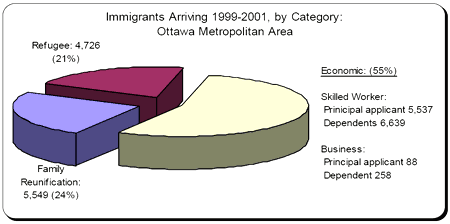
Are Skilled Immigrants Coming to Ottawa?
Three Basic Categories of Immigrants reflect the basic goals of Canada's immigration system: family reunification, economic benefit to Canada, and humanitarian commitment.
Family Class immigrants are persons who are sponsored by a close family member such as a spouse, fiancé, dependent child, parent or grandparent who is already a Canadian citizen or resident.
Economic class immigrants consist of two groups: skilled worker and business immigrants. This class of immigrants is selected for their economic contribution to Canada.
Refugee class immigrants – includes Convention refugees and other displaced persons resettled from abroad.
Of all immigrants to Canada during the 1999 to 2001 period, approximately 23,000 or 3.4% intended to settle in the Ottawa Metropolitan area. The majority of these immigrants (51%) were between the ages of 25 and 44. About one-quarter (23%) were children less than 15 years of age, and a further 14% were youth aged 15 to 24. The remaining 12% were aged 45 and over.
Irrespective of their age, immigrants enter Canada through one of three basic categories. Of the 23,000 immigrants intending to settle in Ottawa between 1999 and 2001, about one-half (53%) were skilled workers (and their dependents), selected for the knowledge, skills and experience needed in Canada’s labour market. About 2% of immigrants to Ottawa fell under the business class, which includes investors, entrepreneurs and self-employed immigrants. About 5,500 immigrants (24% of total) came to Ottawa to join close family members. Refugees made up about 21% of immigrants settling in Ottawa between 1999 and 2001.
Over the past three years, there has been a sharp (44%) increase in the number of immigrants to Ottawa entering through the skilled worker category. Immigrants in this category include "principal applicants" who are selected based on an assessment of skills and domestic labour market demand, and their "dependents" such as spouses or children.